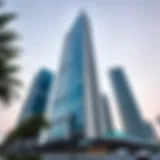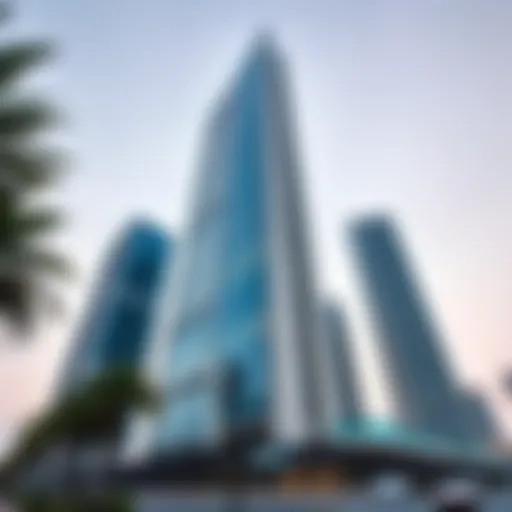Exploring Dubai's Unique Landscape: A Global Hub


Intro
Dubai stands at the crossroads of the world, a destination where tradition meets modernity and ambition knows no bounds. As an international city, Dubai has developed a unique character, shaped by its diverse population and dynamic economy. The city has become synonymous with luxury, innovation, and a lifestyle that's often deemed aspirational by many around the globe.
In this exploration, we will navigate through several components of Dubai's intricate fabric. We will look into the real estate landscape that has evolved dramatically in recent years, revealing current trends and property price fluctuations. Additionally, we'll uncover the various investment opportunities that lie within this vibrant metropolis, shining a light on high-return areas and upcoming developments that could pique the interest of astute investors.
From its cultural richness to the multitude of business prospects, understanding Dubai’s complexities is crucial for anyone considering a stake in this thriving region. Whether you are an investor seeking to capitalize on the city's growth, a prospective expatriate aiming to find a new home, or a real estate agent looking to stay ahead of market trends, the insights in this article are tailored for you.
With this foundation set, let's dive into the nuanced market trends that define Dubai's extraordinary character.
Understanding Dubai's Global Significance
Dubai stands as a beacon within the bustling Middle Eastern landscape. Its global significance cannot be overstated, as it intertwines history, geopolitics, economic might, and cultural diversity into a rich tapestry that attracts a myriad of stakeholders. For investors, homeowners, agents, and analysts, understanding the importance of Dubai as an international city is paramount.
First and foremost, Dubai serves as a gateway between the East and West, facilitating not just trade but also cultural exchanges. The global business community recognizes its strategic location, making it a hub for aviation and shipping, which further emphasizes the city’s role in shaping international commerce. Moreover, Dubai's free zones and favorable business regulations present an enticing landscape for companies across various sectors. With these comforts, 'investor-friendly’ takes on a whole new meaning.
Exploring Dubai's global import has several advantages:
- Diverse Economy: Unlike other cities heavily reliant on oil, Dubai has diversified its economy. Tourism, real estate, and finance play pivotal roles.
- Cultural Melting Pot: With over 200 nationalities, this city embraces cultural diversity, allowing for a vibrant social scene.
- World-class Infrastructure: Dubai boasts cutting-edge facilities that cater to both business and leisure, from the monumental Burj Khalifa to the bustling Dubai Marina.
Such factors position Dubai as a vital player on the world stage, prompting a surge of expatriates and global investors eager to be part of the city's rapid growth.
“Dubai is more than concrete and glass; it’s a vision of the future being crafted at an astonishing pace.”
With a solid understanding of its historical roots and geopolitical positioning, one can appreciate better how these elements blend to create the multifaceted identity Dubai possesses today.
Historical Overview
To understand Dubai's current global significance, it’s essential to glance back at its past. Originating as a humble fishing village in the early 18th century, the paths that led to its present stature are deeply etched in its history. The discovery of oil in the 1960s was a drastic turning point. It propelled the city from obscurity to a major global player, funded large-scale developments, and boosted the economy.
During the 1980s and 1990s, Dubai embraced a vision for diversification, laying frameworks for tourism and trade. Developers, often visionaries themselves, saw the potential and laid down iconic structures that became synonymous with Dubai. This historical trajectory not only shapes the present but also sets the tone for future endeavors. The deep-rooted history of trade, commerce, and cultural exchanges lays the groundwork for anyone looking to immerse themselves into Dubai's intricate landscape.
Geopolitical Position
Dubai's geopolitical significance is marked by its location and influence in the region. Positioned at the crossroads of Europe, Asia, and Africa, it is a pivotal trade nexus. Over 100 airlines operate from Dubai International Airport, linking it to cities around the globe, creating a vibrant hub for tourism and business alike.
Regional tensions can often sway the dynamics; however, Dubai has managed to maintain a sense of stability. Its approach towards diplomacy and economic partnerships makes it a reliable player in the Middle Eastern geopolitical landscape. Moreover, partnerships with neighboring countries enhance trade opportunities, fueling economic development.
The cooperation seen at regional forums underscores its leadership role. Dubai’s handling of relations paints a picture of a city that doesn’t just focus inward but also extends outwards, fostering a conducive environment for growth and international collaboration.
In summary, Dubai’s global significance is characterized by its historical evolution, strategic positioning, and multifaceted economy, all of which serve as foundational elements for investors and professionals aiming to navigate the complexities of this remarkable city.
A Study of Dubai's Real Estate Landscape
Dubai's real estate market is as dynamic as the city itself, offering a fascinating case study for investors, homeowners, and real estate agents alike. It acts as a barometer of the global economy, capturing changes not just locally but also from major markets around the world. The appeal of Dubai as a living and investment destination stems from its rich tapestry of cultural heritage, modern architecture, and full-on luxury lifestyle.
Understanding the real estate landscape helps paint a clearer picture of how to navigate property ventures in a city that has rapidly transformed from a modest trading port into a cosmopolitan hub. The stark contrasts of lavish skyscrapers juxtaposed with traditional markets reveal more than just aesthetics; they indicate a continuous adaptation to the needs of a growing demographic diverse in culture and expectation.
Current Market Trends
The Dubai real estate market has shown a rollercoaster ride of trends that make it a focal point for discussions related to urban development and economic growth. After experiencing some challenges in previous years, the tide has turned, notably post-pandemic, with optimism returning to the sector. Reports and surveys indicate a resurgence in demand, particularly in residential properties, which has soared due to favorable mortgage rates and appealing payment plans.
Recent shifts in buyer behavior suggest a strong preference for larger, family-oriented spaces, especially in suburban areas. Places such as Dubai Hills Estate and Arabian Ranches have seen a marked increase in interest. Investors are also keen on off-plan properties, as developers offer enticing deals that cater to a broad range of clients.
"The real estate sector not only contributes significantly to Dubai's GDP, but also offers an on-the-ground barometer of broader economic sentiment."
Investment Opportunities
With a favorable investment climate, Dubai’s real estate market presents significant opportunities. Different types of properties cater to various investor segments — from luxury villas to affordable apartments, there is something for everyone. Also, developments like the Expo 2020 site are expected to spur further growth, with plans to convert various venues into residential and commercial spaces.
Moreover, the introduction of long-term visas for expatriates has encouraged foreign investment, solidifying Dubai's status as an affordable option for overseas property ownership. Investors can leverage the incentives provided, including tax exemptions and zero income tax policies, making it appealing to both small and large portfolios. Key areas where opportunities lie include:
- Downtown Dubai – Home to the iconic Burj Khalifa, it remains a hub for luxury living.
- DIFC (Dubai International Financial Centre) – A prime location for corporate tenants, sees a consistent demand for upscale apartments.
- Dubai Marina – High tourist footfall drives rental yields.
Real Estate Regulations
Understanding the regulatory framework is crucial for anyone looking to invest in or relocate within Dubai. The government has established clear laws to protect both buyers and investors, making transactions smooth and secure. Key aspects of regulation include the requirement for property registration within a specific timeframe and the need for due diligence when purchasing real estate.
Moreover, recent changes in laws around ownership have made it easier for foreigners to invest in properties. Freehold areas allow foreigners to buy properties, while leasehold agreements also present avenues for investment.
Essential regulations to consider include:
- Strata Law – Governs ownership of shared properties ensuring clarity on communal areas.
- Real Estate Regulatory Agency (RERA) – Enforces standards for real estate practices, enhancing transparency.
These elements create a relatively stable environment for real estate operations, but staying informed continuously is crucial given the fast-paced changes.
Diversity and Demographics
Diversity and demographics in Dubai play a crucial role in defining the city’s unique character and its appeal as a global hub. As a melting pot of cultures, Dubai attracts talent and investment from around the world, creating a dynamic tapestry that not only enriches the local culture but also fosters economic growth. This diversity brings with it numerous benefits and considerations that potential investors, homeowners, and industry professionals must keep in mind.
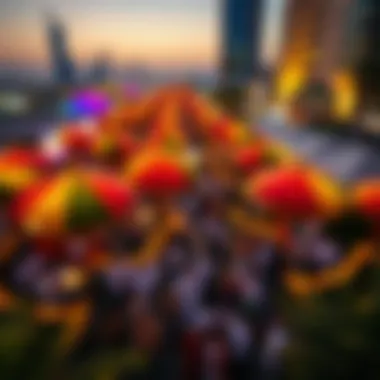
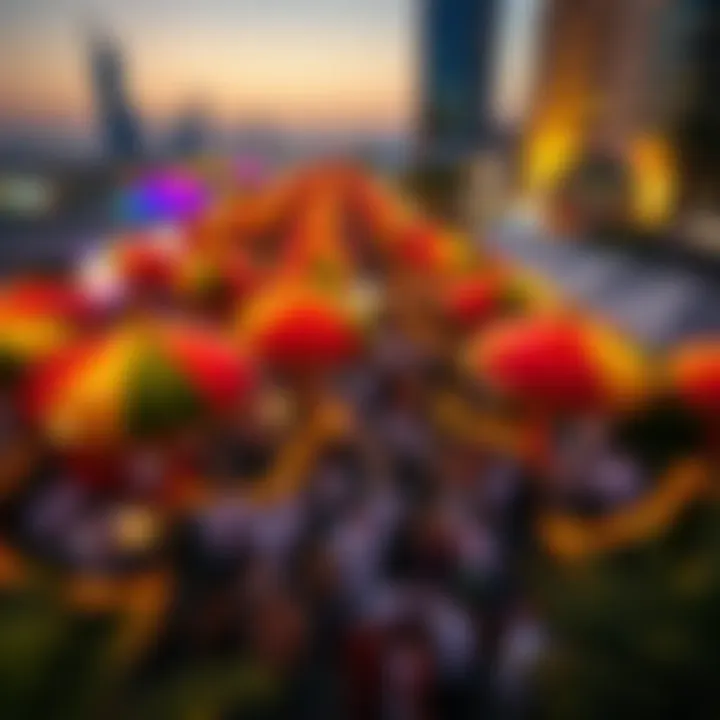
One significant aspect of Dubai's demographics is its cultural composition. The city is home to a staggering variety of nationalities, with expatriates forming nearly 90% of the population. This composition leads to a vibrant social fabric where cultural festivals, culinary experiences, and artistic expressions from multiple backgrounds coexist harmoniously.
Cultural Composition
In reviewing the cultural composition of Dubai, one must uncover the layers that contribute to its charm. The mix of traditions from South Asia, the Middle East, Europe, and beyond fosters a unique environment. Here are key points on the cultural aspects:
- Festivals: From Diwali to Eid, various cultural events are celebrated, allowing residents to engage with one another and share their heritage.
- Cuisine: Dubai offers a smorgasbord of food options, reflecting global tastes. Whether it’s enjoying Indian curry or Lebanese falafel, food becomes a nexus of cultural exchange.
- Art and Music: Galleries and performance venues showcase works that resonate with the city's diverse populace. Musicians and artists often find inspiration in their intercultural experiences, contributing to a rich artistic scene.
These elements underscore how cultural diversity influences the lifestyle in Dubai, fostering an open environment conducive to collaboration and innovation.
Expatriate Communities
With expatriates forming the backbone of Dubai's workforce, understanding these communities is essential. Investors and business owners must consider their dynamics when developing projects. What sets expatriate communities apart in Dubai?
- Cultural Networks: Expat communities frequently establish networking platforms that help newcomers integrate. These networks play a vital role in business opportunities.
- Supportive Services: From schools to healthcare, communities often offer resources tailored to specific nationalities, making it easier to settle. This factor greatly affects families considering a move.
- Social Clubs and Associations: Numerous clubs cater to particular nationalities, providing spaces for social interaction and cultural sharing, enhancing the sense of belonging.
The strength of Dubai lies in its diverse human capital, making it a robust contender in a highly competitive international market.
A deep grasp of diversity and demographics ultimately shapes strategic planning and decision-making for investors and homeowners. Understanding the blend of cultures and the nuances of expatriate life can turn potential challenges into opportunities as Dubai continues its journey as an international city.
For further reading on this dynamic city, check out resources such as Wikipedia and Britannica.
Economic Resilience
Understanding economic resilience is crucial when looking at Dubai. The city's ability to bounce back from economic shocks speaks volumes about its structure and planning. Over the years, Dubai has proven itself to be more than just a glimmering oasis in a desert; it stands as a beacon of opportunity amid global uncertainties.
A key element to this resilience is its diverse economic sectors. Unlike many economies that heavily depend on a single sector, Dubai has broadened its economic base. Trade, tourism, real estate, and finance are just a few sectors that contribute to its economic fabric. By diversifying, the city minimizes risks associated with downturns in any one industry. This polycentric model allows for stability, making it attractive to investors looking for a shelter against economic volatility.
- The tourism industry, for example, has become a lifebuoy during turbulent times. Dubai's strategic marketing and unique attractions draw millions of visitors each year, thereby generating substantial revenue not only for hotels but also for restaurants, retail, and various service sectors.
- Additionally, the real estate market has consistently shown resilience, adapting to changing market demands and regulations. Recent trends show a remarkable growth in the development of luxury properties and affordable housing, catering to both upscale buyers and middle-income families.
- Finance and logistics also feature prominently, bolstering Dubai's role as a global trade hub. With a strategic location bridging East and West, the city has turned into a central point for global logistics and finance.
Moreover, government policies play a critical role in maintaining economic health. The Dubai government continually invests in infrastructure and smart city initiatives, making the environment conducive for businesses. The regulatory framework has evolved to be agile, adapting to the needs of both local and international investors.
Diversified Economic Sectors
Economic resilience thrives on the backbone of diversified sectors. Following are key areas that stand out:
- Tourism: This sector is not just about sun and sand; it has grown to include cultural experiences, MICE (meetings, incentives, conferences, and exhibitions), and wellness tourism.
- Real Estate: The sector has moved beyond mere residential and commercial spaces to include sustainable buildings and smart homes.
- Technology Startups: An emerging segment contributing to the economic diversity, these businesses are leveraging Dubai's supportive ecosystem to address regional challenges.
- Finance: With a range of financial services rising, including Islamic finance, Dubai is positioned as a financial hub with global reach.
Impact of Tourism
Tourism has not only added glamour to Dubai but also made a profound impact on its economy, acting as a significant catalyst for growth.
The anvil on which much of Dubai’s prosperity is forged, tourism enriches a multitude of other sectors. Most noticeably, it stimulates job creation, with thousands employed in hospitality, retail, and entertainment.
"Tourism accounts for about 11% of the GDP, showcasing its vital role in shaping Dubai's economic landscape".
Moreover, the ripple effect of tourism is felt across various service sectors. From the gourmet food scene to bespoke shopping experiences, every aspect of daily life seems to echo the trends within this sector.
For more in-depth insights, you can check out resources like Invest in Dubai, or read more about its economic strategies at Dubai's Economic Department.
Related Resources
Infrastructure and Development Projects
The development of infrastructure in Dubai is not just a matter of construction; it's a blueprint for future progress. As an international city, Dubai thrives on its ability to connect various facets of urban life—from commerce to community interactions. Understanding the infrastructure and development projects underway provides insights into the city’s ambitions and how they impact various stakeholders, including investors, homeowners, and businesses.
The essence of these projects lies in their ability to enhance the livability and economic dynamism of Dubai. As a hub that attracts global talent and tourists, the city constantly adapts and expands its urban framework to sustain growth and improve the quality of life.
Transportation Networks
Transportation plays a pivotal role in the city's economic ecosystem. The roads, railways, and public transport facilities are the lifelines connecting Dubai with the rest of the world. One significant initiative is the Dubai Metro, which is not just a transportation tool but also a cyber-technological marvel. This system ensures commuters enjoy a reliable and efficient means of travel, addressing the congestion that can plague urban environments.
In addition to conventional infrastructure, the integration of smart technologies has revolutionized how people navigate the city. Real-time traffic updates and smart public transport systems optimize movement, making it easier for both residents and visitors to get from point A to point B swiftly. Not to mention the ongoing expansions, like the potential of extending the metro to cover even more areas, ensuring accessibility.
Moreover, one cannot overlook the role of the newly constructed roadways and bridges that are structured to ease travel times. This reduces bottlenecks and makes the city more navigable, which in turn boosts economic activity. Investors keen on commercial properties will find the proximity to these networks advantageous, as they tend to increase property value.
Sustainable Initiatives
Sustainability is another cornerstone of Dubai’s infrastructure vision. As the city evolves, there’s a clear inclination toward environmentally-conscious projects. Initiatives such as the Dubai Clean Energy Strategy aim for a diversification of energy sources, with a goal to making 75% of the city’s energy consumption from clean sources by 2050.
In practice, this means investments in solar parks, such as the Mohammed bin Rashid Al Maktoum Solar Park, which showcases how renewables can be utilized on a larger scale. Furthermore, buildings across the city are being encouraged to adopt green certifications, thus raising the benchmarks for energy efficiency. There's a palpable shift in how construction and development projects are assessed—now more than ever, potential investors need to consider the environmental sustainability of their projects.
Beyond energy, sustainable initiatives also extend to waste management, water conservation, and green spaces. The introduction of smart waste management systems is a leap forward, transforming how refuse is processed and leading the way for a cleaner urban environment.
Investors looking at Dubai must factor these sustainable practices into their evaluations. Not only do they align with global trends towards environmental responsibility, but they also enhance brand reputation, particularly among eco-conscious consumers and businesses.
In summary, the infrastructure and development projects in Dubai are not static but rather dynamic elements driving the city’s growth. By embracing both advanced transportation solutions and sustainable practices, Dubai positions itself as a model for international cities.
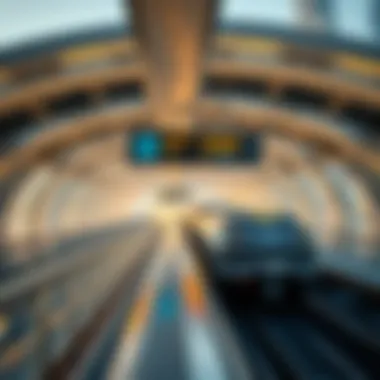
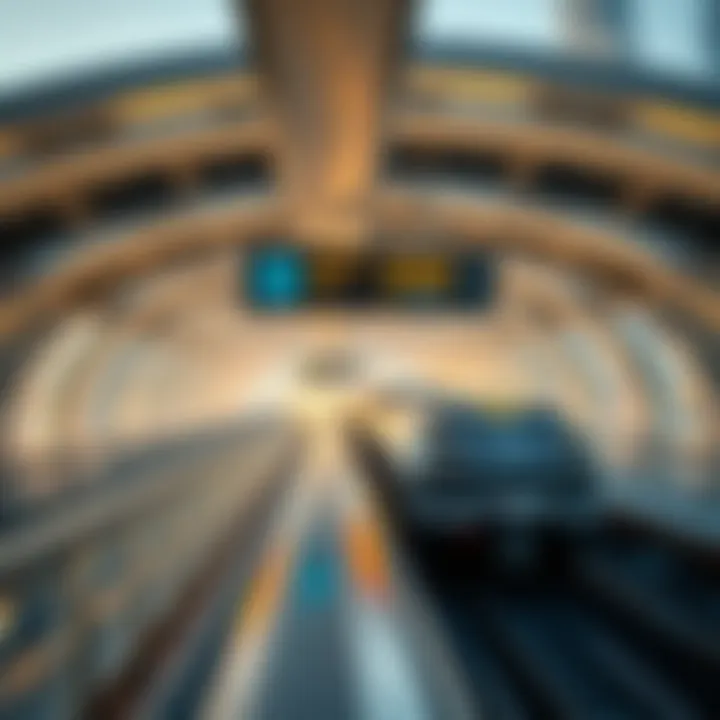
"Infrastructure is much more than physical structures; it is the backbone that holds society together and dictates its progress."
As Dubai continues on this trajectory, all parties involved—whether as investors, residents, or visitors—stand to benefit from a city that is not only aiming for the stars but is grounded in thoughtful planning and execution. Discover more about Dubai’s ongoing projects at Dubai Land Department and get firsthand knowledge on current trends and future developments.
The Lifestyle in Dubai
The lifestyle in Dubai is not just a collection of leisure activities; it represents the confluence of tradition and modernity, making it a unique fabric of various experiences tailored for its diverse populace. From luxurious dining options to countless recreational activities, the lifestyle here appeals to both expatriates and locals alike, blending the old-world charm of the Middle East with contemporary global trends. A thorough understanding of this lifestyle becomes crucial for anyone considering residence or investment in this dynamic city.
Culinary Scene
Dubai's culinary scene is a testament to its cosmopolitan nature. The sheer variety of dining options available can leave even the seasoned foodie in awe. From street food stalls serving authentic shawarma to five-star restaurants helmed by world-renowned chefs, there’s something for every palate. Restaurants like Zuma and Nobu offer not just meals but experiences, while local eateries present a chance to sink your teeth into traditional Emirati dishes like Al Harees or Shawarma.
However, it’s not just about food; it’s about the stories behind them. Influences from the Indian subcontinent, the Middle East, and beyond make Dubai a melting pot of flavors. Food festivals throughout the year, such as the Dubai Food Festival, showcase this fusion and bring the community together through shared culinary experiences.
Additionally, for those who embrace healthier choices, Dubai has also seen a surge in vegan and organic restaurants catering to a growing demographic focused on sustainable living. This is significant for investors and homeowners who wish to understand the shifting trends in the health-centric food market.
Recreational Facilities
When it comes to recreational facilities, Dubai truly stands out. The city boasts an impressive array of parks, malls, and beachfronts that are designed not just for enjoyment but also for relaxation and social engagement. The Dubai Marina Walk, for example, is an excellent example, integrating walking paths with stunning views of the yachts and high-rise buildings.
Sports enthusiasts will find themselves spoiled for choice. The Dubai Sports City features facilities for cricket, football, and even ice hockey. For those who prefer water sports, the beaches offer a wide range of activities from jet skiing to parasailing.
Moreover, family-friendly venues like Dubai Parks and Resorts and Aquaventure Waterpark provide not just thrills but also bonding experiences. These attractions not only cater to residents but also to tourists, thus playing a significant role in the economy.
For expatriates and investors, understanding these recreational dynamics can help gauge the demographics and lifestyle preferences of potential housing markets. A thriving recreational scene often translates into higher property values, making it a key consideration for investment.
"In Dubai, life is not just lived; it is curated, creating a lifestyle that is as dynamic as the city itself."
In summary, understanding the lifestyle in Dubai—a medley of rich culinary experiences and ample recreational opportunities—offers crucial insights for anyone looking to settle or invest in the city. The vibrant lifestyle not only enriches daily living but also has a profound impact on the overall economy and community fabric of this global metropolis.
Challenges of Living in Dubai
Living in Dubai can present a kaleidoscope of both opportunities and challenges, as expats and locals alike navigate the complexities of this international city. Attention to these challenges is critical for both potential investors and those looking to make Dubai their home. While the lure of luxury high-rises and pristine beaches may be hard to resist, understanding the intricacies of the environment is crucial for long-term planning and satisfaction in any venture here.
Cost of Living
In recent years, the cost of living in Dubai has seen a significant uptick, which can catch newcomers off guard. Monthly rents can soar, especially in popular neighborhoods like Dubai Marina and Downtown Dubai. It's not unusual for a two-bedroom apartment to command around AED 100,000 to AED 150,000 annually, depending on location and amenities. Then there's the cost of daily necessities, from groceries to utilities, which can add up to make one’s wallet feel a bit lighter.
However, it’s important to weigh this against the lucrative salaries that many industries offer. For example, positions in finance or tech often come with compensation packages designed to match the high living costs. Yet, staying on top of expenses and budgeting is vital, as many expats find that their spending habits can shift drastically once they settle in.
- Rent: Expect to pay significantly in rent. Choose locations wisely to balance budget and convenience.
- Groceries: While some international products can be pricey, local brands are often more affordable.
- Utilities: The costs for electricity and water can be higher than in many Western countries, so checking suppliers and being mindful of usage is advised.
Despite the pitfalls, many are drawn to Dubai's vibrant lifestyle, promising career opportunities, and potential returns on investment in real estate.
Regulatory Environment
Navigating the regulatory landscape in Dubai can be like walking through a maze—at times confusing but immensely rewarding if done right. Different regulations exist for various sectors including real estate and employment, meaning that what might apply to one scenario may not hold for another. For instance, investors must grasp the rules surrounding property ownership in off-plan projects versus ready-to-move-in apartments.
A standout feature of Dubai's business climate is its push toward transparency and adaptability. Regulations have evolved over time, in many cases, reflecting global standards. However, gaps may still exist that require careful consideration. Potential investors need guidance to adeptly maneuver this terrain. Here are a few key aspects to note:
- Real Estate Laws: Familiarize yourself with laws related to property ownership, especially in freehold areas where foreign ownership is allowed.
- Business Licensing: Starting a business requires specific licenses related to your operating sector and geographical zone.
- Residency Requirements: Investors often benefit from residency permits but must keep updated on criteria that can change based on various policies.
The best course of action is to engage with legal experts in the field to reduce risk in investments and enhance understanding of ongoing regulatory changes.
"Understanding the regulatory environment is not just beneficial but essential for successful investment in Dubai."
Ultimately, awareness about the financial landscape and legal guidelines allows for informed decisions, empowering individuals to thrive amidst the complexities of Dubai's vibrant setting.
Cultural Integration and Social Dynamics
Cultural integration and social dynamics play a pivotal role in the fabric of Dubai. As a city that has embraced a medley of cultures, understanding these aspects is essential for anyone looking to navigate its intricate landscape. The implications for investors, expats, and residents alike are profound, allowing for richer connections and smoother transitions in lifestyle and business.
At the heart of this integration is the idea that Dubai is not just a melting pot but a vibrant tapestry woven from the threads of diverse communities. This intertwining of cultures fosters an environment where ideas can flourish and innovation can bloom, making the city a hotspot for forward-thinking individuals. It’s essential to recognize the mutual benefits of cultural exchange, as it allows for a greater understanding among residents.
Community Engagement
Community engagement in Dubai highlights the importance of active participation within neighborhoods. When people from different backgrounds come together, enriching interactions naturally arise. Many community initiatives offer opportunities for residents to be involved in projects ranging from environmental clean-ups to cultural festivals. Such involvement breeds a sense of belonging, breaking down the barriers that sometimes separate cultures.
- Local initiatives can help expats integrate more seamlessly into Dubai's social fabric. There are numerous events, workshops, and meet-ups organized by community centers or social clubs that encourage residents to share their experiences and learn from one another.
- For example, the Dubai Fitness Challenge and various food festivals not only promote wellness and gastronomy but also encourage a sense of camaraderie among participants.
- Furthermore, these events often attract global sponsors, which aligns perfectly with the cosmopolitan nature of the city.
Cultural Sensitivity
Cultural sensitivity is another crucial aspect of life in Dubai. Understanding and respecting local customs, traditions, and norms can vastly improve interactions with Emirati nationals as well as fellow expats. The city's population is predominantly made up of expatriates, yet the backbone of its social structure remains rooted in Emirati culture.
"To thrive in Dubai, understanding the delicate balance between preserving one’s cultural identity and embracing the local way of life is essential."
- Respecting traditions: Time-honored practices, such as observing quiet hours during Ramadan or dressing appropriately in public spaces, go a long way in demonstrating cultural respect.
- Conflict resolution: The ability to navigate cultural sensitivities can also aid in conflict resolution, as many misunderstandings arise from hidden cultural references or misinterpretations. Engaging in dialogue and seeking to find common ground can mitigate potential disputes.
- Learning opportunities: Cultural sensitivity also opens the door to learning new customs. This enriches one's personal and professional experiences, creating a nuanced understanding of the market and the people within it.
In essence, Dubai’s dynamic interplay of cultures presents an opportunity for richer interactions and collaborations that bolster its international standing. Understanding community engagement and cultural sensitivity will thus be paramount for anyone wishing to succeed in this unique environment.
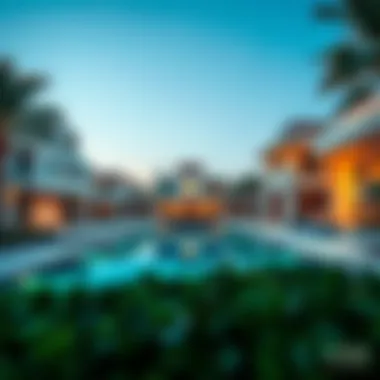
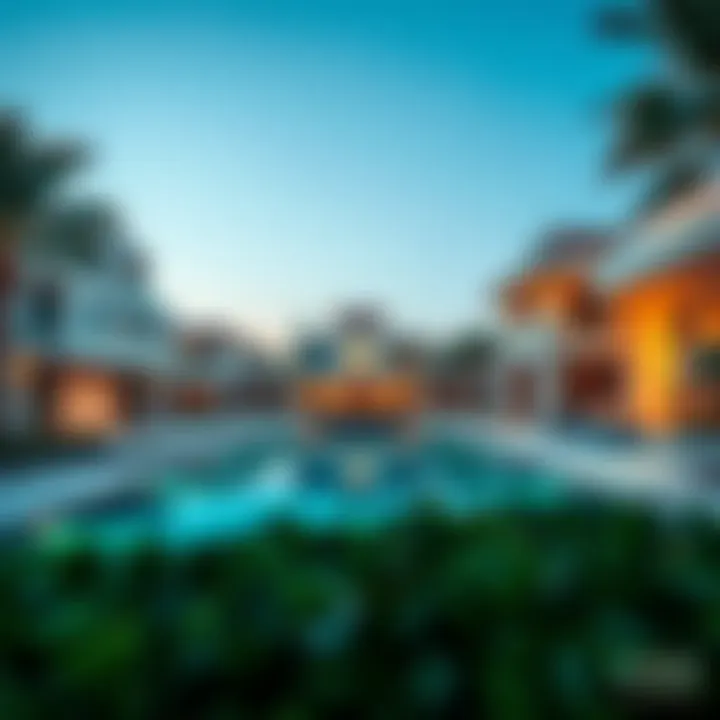
By embracing these principles, individuals not only position themselves favorably within the local framework but also contribute to the overall prosperity of this global hub.
Technology and Innovation in Dubai
Dubai stands at the forefront of innovation, blending tradition with modernity at an astonishing pace. This commitment to technology plays a critical role in shaping its identity as a global city. By embracing digital advancements, Dubai is not only improving the quality of life of its residents but also attracting businesses and investors from all corners of the globe. A dive into its technological initiatives reveals that the city’s transformation is not merely about adopting new gadgets or systems but about fostering an ecosystem geared towards sustainability, efficiency, and growth.
Smart City Initiatives
Smart city initiatives in Dubai reflect a vision where technology serves to enhance urban living. Dubai Smart City is driven by the aspiration to make entire city operations more transparent, efficient, and connected. The relevance of these initiatives cannot be stressed enough, as they not only streamline day-to-day functions but also present vast opportunities for foreign investment.
Key Elements of Smart City Initiatives:
- Integrated Transport Systems: With innovations like the smart RTA app, residents can manage transportation needs via their smartphones. These conveniences reduce reliance on personal vehicles, contributing to lower road congestion and environmental impact.
- Cloud Computing for Public Services: Government services are increasingly delivered through user-friendly platforms. This development reduces wait times and enhances service satisfaction.
- Smart Energy Management: Initiatives aimed at reducing energy consumption through smart grids and solar initiatives not only lessen costs but can also have long-term benefits on the environment.
These initiatives are more than just technological upgrades; they symbolize a commitment to sustainable living and efficient governance, showing potential investors that Dubai is not just a place for short-term gains but a city investing in its future.
Digital Transformation in Real Estate
In the realm of real estate, Dubai's technological revolution is truly noteworthy. The digitization of property transactions, as well as the rise of PropTech solutions, has revolutionized how properties are bought, sold, and managed.
Benefits of Digital Transformation in Real Estate:
- Transparency in Transactions: With blockchain technology being integrated into property transactions, buyers and investors can enjoy unprecedented levels of transparency and security. This shift diminishes the risk of fraud and ensures that transactions are seamless.
- Virtual Tours and Augmented Reality: Potential buyers can now engage in virtual tours, allowing them to view properties from anywhere in the world. This technology aids in making informed decisions without the need to travel extensively.
- Data Analytics for Market Insights: Utilizing big data analytics, developers and investors can identify trends and patterns within the real estate market. This capability allows them to make strategic investments and tailored offerings.
In essence, the digital transformation of Dubai’s real estate landscape is not just about convenience. It revolutionizes the way businesses and consumers interact, fostering a more dynamic market.
The success of Dubai's technology and innovation initiatives illustrates how the city has positioned itself as a leader of change, drawing in investors eager to capitalize on a future-focused environment.
For further insights, you can follow discussions on Reddit or explore more about Dubai's innovation at Dubai's Government Portal.
Legal Considerations for Investors
When delving into the investment opportunities that Dubai presents, understanding the legal landscape is paramount. The right knowledge about legal considerations can make the difference between a successful venture and a costly mistake. Investors looking to tap into Dubai's real estate market must remain well-informed about local laws, property ownership stipulations, and the various mechanisms available for resolving disputes. This section encapsulates the essential elements that every investor should ponder before planting their roots in this bustling metropolis.
Property Ownership Laws
In Dubai, property ownership laws reflect a blend of tradition and modernization. The UAE allows for freehold ownership in certain areas; however, it’s not all cut-and-dried. Foreign investors can acquire properties in designated zones, such as Dubai Marina or Downtown Dubai. It's crucial to navigate this minefield correctly to avoid any potential hiccups.
Here are some core aspects of property ownership laws in Dubai:
- Freehold vs. Leasehold: Freehold properties grant complete ownership, while leasehold arrangements typically span 99 years, after which ownership reverts to the landowner.
- Investment Zones: Familiarity with areas designated for foreign investment is essential. Properties in these zones can be fully owned by foreign nationals.
- Registration Process: The formalities involved in registering a property with the Dubai Land Department can be daunting. Ensuring all documents are accurate can save investors from grueling legal battles down the road.
- Ownership Structures: Investors might consider establishing a company to manage their real estate investments effectively, especially if eyeing multiple properties. Different ownership structures can offer different levels of tax efficiency.
Understanding these legal peculiarities not only aids compliance but also secures investors' peace of mind, enabling sound decision-making.
Dispute Resolution Mechanisms
With any investment, the potential for disputes exists. This is why understanding how disagreements are resolved is vital for investors. Dubai has established various mechanisms aimed at providing efficient and effective resolution of disputes, be they property-related or otherwise.
Key features of dispute resolution in Dubai include:
- Dubai Rental Disputes Center: This specialized center addresses disputes specifically related to rental agreements. It offers a speedy resolution process primarily focused on protecting tenant and landlord rights.
- Judicial System: The UAE’s judicial framework is robust, with laws that pertain to property and contracts laid out clearly. Investors should familiarize themselves with the court system and its processes.
- Mediation and Arbitration: Employing alternative dispute resolution (ADR) methods, like mediation or arbitration, can often lead to faster and less adversarial outcomes. This method is increasingly favored in business dealings, providing a more amicable environment for conflict resolution.
- Legal Counsel: Engaging local legal counsel with expertise in real estate can assist in navigating disputes more effectively. Analyzing potential risks and ensuring that all agreements are watertight can help mitigate future issues.
For investors, understanding these mechanisms can be the shield they need. Proper preparation regarding legal considerations not only empowers investors but helps them cultivate fruitful dealings in this international playground.
"Knowledge is power. In a place as dynamic as Dubai, being legally savvy can make all the difference in securing a successful investment venture."
A comprehensive understanding of these legal considerations can foster more informed participation in Dubai's thriving market, ensuring that investors are both protected and empowered.
Future Prospects of Dubai
The topic of future prospects in Dubai serves as a pivotal part of understanding the city's progression and adaptability in an ever-changing global landscape. Investors, homeowners, and industry analysts are particularly keen on grasping how urban development and emerging markets could shape their interests and opportunities within this vibrant metropolis. Thus, it's crucial to look closely at what lies ahead and the factors influencing growth in the region.
Urban Development Plans
Dubai is known for its ambitious urban development projects that continually reshape its skyline and infrastructure. Standout initiatives like the Dubai Urban Development Strategy and the Vision 2040 plan aim to enhance livability while promoting innovation and sustainability. According to the Dubai Land Department, these plans focus on not just expanding the city, but making it even more livable for residents.
Key aspects of the urban development plans include:
- Smart City Initiatives: Modern technological integrations such as automated traffic management systems and smart waste management are being implemented to improve efficiency.
- Transport Infrastructure Upgrades: The ongoing extension of the metro lines and the introduction of new public transport options are designed to ease congestion and enhance accessibility.
- Green Spaces: There’s a noteworthy commitment to developing parks and recreation areas. With nearly 40% of the area designated for such spaces, it provides a refreshing contrast to the urban hustle.
"Dubai aims to be a city that offers a high quality of life and sustainability for its residents."
These developments are not merely architectural; they contribute to economic diversification and the attraction of foreign investment. Furthermore, aligning with global sustainability standards marks Dubai as a forward-thinking city, well-positioned to thrive in the coming years.
Emerging Markets
Alongside its urban development, Dubai is making strides in diversifying its economy by tapping into emerging markets. The city's strategic location makes it a pivotal gateway between East and West, enabling it to attract businesses from various sectors such as technology, logistics, and renewable energy.
Promising sectors include:
- Technology and Fintech: With the establishment of Dubai Internet City and numerous accelerators, startups in tech are flourishing. A growing number of investors are looking at Dubai as a launchpad for innovative ideas.
- Sustainable Energy: The Mohammed bin Rashid Al Maktoum Solar Park is one of the largest renewable energy projects globally, emphasizing Dubai's shift towards eco-friendly energy sources.
- Health and Biotechnology: The healthcare sector is attracting significant investments, driven by an increasing demand for advanced medical technologies and services.
Successfully leveraging these emerging markets can offer lucrative opportunities for investors. The city's commitment to economic growth and innovation presents a landscape ripe for exploration, with many opportunities just waiting to be capitalized on.
In summation, the future prospects of Dubai reveal a high potential for growth across various sectors. Investors and residents alike should keep a close eye on urban plans and emerging market trends, positioning themselves accordingly in this international city that continues to evolve and expand.


